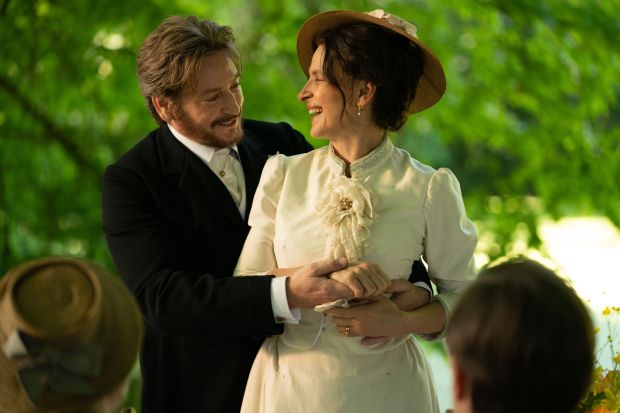From the opening meal preparations taking us from garden to stove to stomach, to the timing of the closing shot in the same exquisite provincial kitchen, “The Taste of Things” knows how to entice. It’s a lovely Valentine’s Day week offering, as well as the best thing in theaters right now by a French country mile.
Plus it has Juliette Binoche, who requires no exclamation point, but nonetheless: Juliette Binoche! She appears here opposite her one-time real-life romantic partner Benoît Magimel. No one else in the history of cinema can do side-eye with a smile the way Binoche can. In “The Taste of Things,” there are times you sense she’s recalling certain aspects of their actual former relationship, in real-time, while revealing what her character is thinking about her employer.
He’s also her lover, and theirs is a simple and complicated arrangement, just as “The Taste of Things” is both complicated and simple. Adapting, very loosely, the 1924 novel “The Passionate Epicure,” the French Vietnamese writer-director Tran Anh Hung tells the story of the cook, Eugénie, and her relationship with the gourmand, Dodin.
His relatively modest but insanely attractive country manor hosts much of the action. For 20 years, this daughter of a Paris pastry chef has worked for Dodin, leaving her bedroom door open on the nights she welcomes him into her bed. They are, as she says, closer than most married couples: Examining and debating recipes (we hear about that part, more than we see it), doing the prep, slicing, basting, gutting (fish) and sautéing (basically everything that isn’t baking or roasting), Eugénie and Dodin share a love language of few words but infinite expression.
We get all we need to know in the opening 40 minutes. No single-take bravura here. Instead, the film proceeds as a fluid, elegantly staged and edited series of visual instructions. Dodin’s design for living, and for hosting another stunning meal, begins before sun-up with Eugénie in the garden, selecting carrots and lettuce for the midday feast to come.
If my own experience is any guide, by minute six of “The Taste of Things” you may be ever-so-slightly-audibly drooling. When the last bite of the breakfast omelette transitions immediately into Eugénie’s preparations for a grand luncheon for five — veal chops, a heart attack of a creamy seafood chowder, followed by Baked Alaska — you may enter, as I did, a sort of fugue state. It’s the opposite of the peak-crisis kitchen frenzy of “The Bear.”
The narrative is slight, but enough. The kitchen girl, Violette (Galatéa Bellugi) has a young niece (Bonnie Chagneau-Ravoire) very much interested in cooking. She’s also a phenom: Tasting her first mouthful of Bourguignotte sauce, the girl identifies nearly every ingredient, at Dodin’s urging, down to the juniper berries. Her culinary ambitions deserve encouragement. Eugénie provides it.
But Eugénie is not well, which we glean at the close of those first 40 minutes. As the story develops, director Hung forces Dodin, the ultimate man of leisure, to take certain initiatives he’d otherwise avoid. For years he has proposed marriage, gently but persistently, to Eugénie. She doesn’t see any advantage in that. “Aren’t we happy like this?” she asks, though it’s more of a statement than a question. The film becomes a genteel battle of wills, without once ginning up conflict for the sake of narrative tension. Set around the year 1890, Hung’s tale manages a difficult feat: It feels and sounds and breathes like a story happening in that specific period, rather than a late-19th century fairy tale marked by attitudes and behavior belonging to our time, not the characters.’
There are longueurs here and there. Sometimes the near-total lack of friction between any of the characters carries trace elements of science fiction, or another species entirely. In a recent Tribune interview, Binoche acknowledged an occasional clash on set involving Hung, who is French Vietnamese and a committed believer in emotional minimalism, and the actor’s own mastery of external emotions at key moments.
But those opposing temperaments have a way of working out, at least when making a movie. As far back as the magical Saigon-set romance “The Scent of Green Papaya” (1993), and more recently in his adaptation of the Haruki Murakami novel “Norwegian Wood” (2012), Hung has studied what love looks like, to both audiences and to his characters. Sometimes it’s idealized to the hilt; other times, the beauty of the settings and the lighting signals an imminent turn, or decision point.
With cinematographer Jonathan Ricquebourg, Hung gives each and every camera subject in “The Taste of Things” the de luxe visual treatment, but the visual mobility when the kitchen’s bustling, for example, is neither too much nor too much at a remove. There’s life, lived with serenity and purpose and, yes, plenty of money and property, in the lives depicted in Hung’s film. Binoche and Magimel see to it in every scene, with or without utensils.
“The Taste of Things” — 3.5 stars (out of 4)
MPA rating: PG-13 (for some sensuality, partial nudity and smoking)
Running time: 2:15
How to watch: Now playing in theatrical wide release
mjphillips@chicagotribune.com





